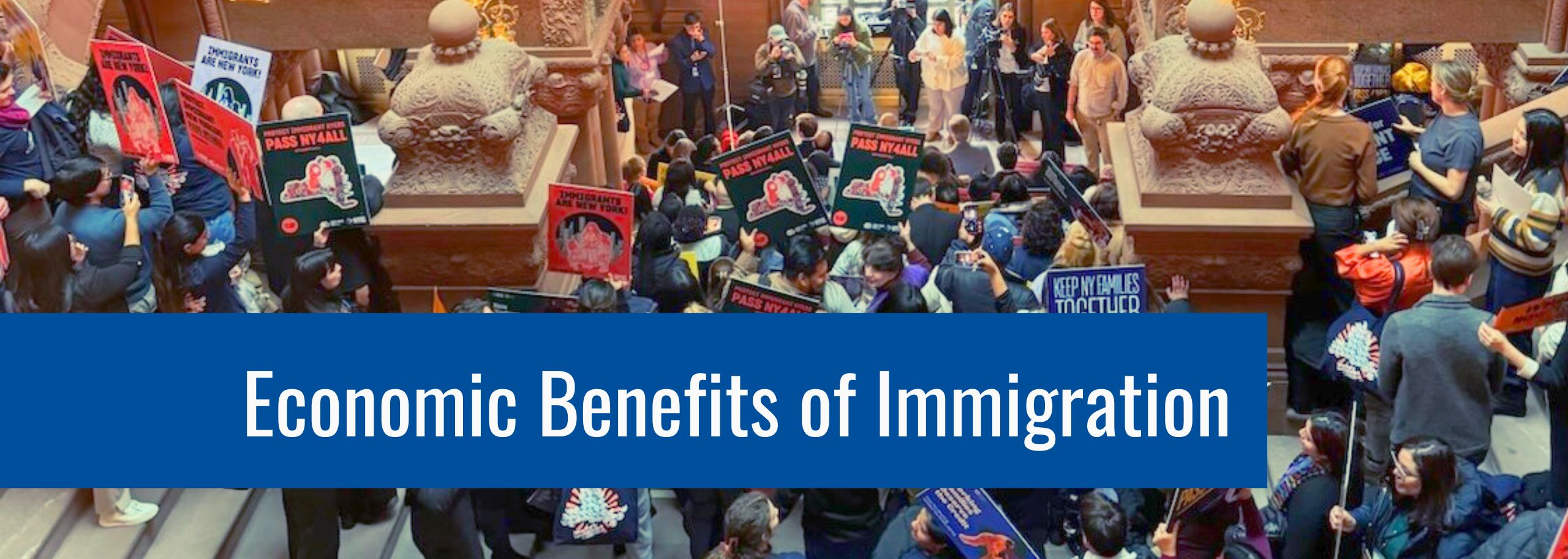Immigration is good for the U.S. economy as a whole and the New York economy specifically. Immigration is key to filling workforce needs, creating new businesses, building up our tax base and fueling innovation. Read more below about how immigrants benefit the economy.
Declining birth rates and increasing deaths across an aging population could be damaging to the U.S. economy, but immigration can offset these losses.
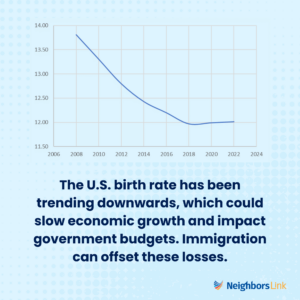 The U.S. birth rate has been trending downward for many years, dropping almost 23% between 2007 and 2022. In addition, population growth overall has been slowing. Last year, the U.S. grew by 0.5% and two-thirds of that growth came from international migration. Without immigration, the U.S. population is projected to decline as deaths are forecast to outpace births by the late 2030s. This creates concern because an older, smaller population can slow economic growth and impact government budgets. Immigration is critical to increasing the overall population size and maintaining a senior-to-working-age ratio.
The U.S. birth rate has been trending downward for many years, dropping almost 23% between 2007 and 2022. In addition, population growth overall has been slowing. Last year, the U.S. grew by 0.5% and two-thirds of that growth came from international migration. Without immigration, the U.S. population is projected to decline as deaths are forecast to outpace births by the late 2030s. This creates concern because an older, smaller population can slow economic growth and impact government budgets. Immigration is critical to increasing the overall population size and maintaining a senior-to-working-age ratio.
Sources: CDC, United States Census Bureau
The U.S. economy depends heavily on the immigrant workforce. Population trends indicate that this will only become more important in the future.
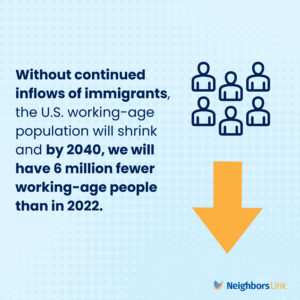 In 2023, immigrants made up a record 18.6% of the U.S. labor force. The participation of immigrants in the labor force has been key to the United States’ economic rebound from the pandemic. From January 2023-2024, about 50% of the labor market’s growth came from foreign-born workers.
In 2023, immigrants made up a record 18.6% of the U.S. labor force. The participation of immigrants in the labor force has been key to the United States’ economic rebound from the pandemic. From January 2023-2024, about 50% of the labor market’s growth came from foreign-born workers.
Without continued inflows of immigrants, the U.S. working-age population will shrink and by 2040, we will have 6 million fewer working-age people than in 2022.
Finally, despite popular perceptions to the contrary, research has shown that immigrants generally do not take jobs away from native-born workers. Instead, immigration is associated with a net gain in job availability for all workers. One of the main reasons for this is that immigrants create new businesses at much higher rates than U.S.-born citizens. A recent report found that immigrants are 80% more likely than U.S.-born citizens to create new businesses. New business creation leads to more employment opportunities for all workers, including native-born Americans.
Economic projections indicate that immigration will significantly bolster the U.S. economy over the next decade
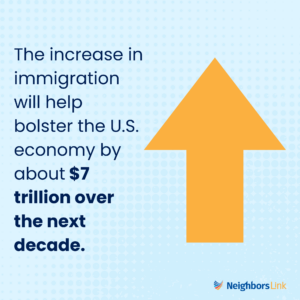 The current increase in immigration will help bolster the U.S. economy by approximately $7 trillion over the next decade, according to the Congressional Budget Office’s Budget and Economic Outlook for 2024-2034. This projection is based on the increase in immigration that began in 2022 continuing through at least 2026. The increase in immigration expands the labor force, boosts consumer spending and increases economic output.
The current increase in immigration will help bolster the U.S. economy by approximately $7 trillion over the next decade, according to the Congressional Budget Office’s Budget and Economic Outlook for 2024-2034. This projection is based on the increase in immigration that began in 2022 continuing through at least 2026. The increase in immigration expands the labor force, boosts consumer spending and increases economic output.
Source: Congressional Budget Office
Almost half of Fortune 500 companies were founded by immigrants or children of immigrants
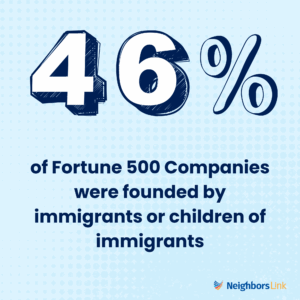 A recent report by the the American Immigration Council found that more than 46% of Fortune 500 companies in 2025 were founded by immigrants or children of immigrants. The Fortune 500 is a list of the largest U.S companies by their total revenue. This report is a reminder of the critical role that immigrants play in the American economy.
A recent report by the the American Immigration Council found that more than 46% of Fortune 500 companies in 2025 were founded by immigrants or children of immigrants. The Fortune 500 is a list of the largest U.S companies by their total revenue. This report is a reminder of the critical role that immigrants play in the American economy.
Source: American Immigration Council
Asylees and refugees add more to tax revenues than they cost in government services
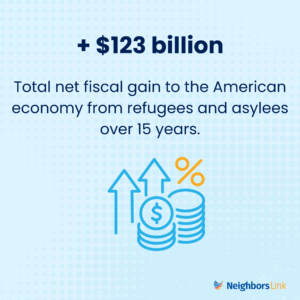 A recent report by the U.S. Department of Health and Human Services found that refugees and asylees have generated $123 billion more in local, state, and federal tax revenues over the last 15 years than they have cost in direct government services. This data shows that asylees and refugees represent a net fiscal gain across all levels of government.
A recent report by the U.S. Department of Health and Human Services found that refugees and asylees have generated $123 billion more in local, state, and federal tax revenues over the last 15 years than they have cost in direct government services. This data shows that asylees and refugees represent a net fiscal gain across all levels of government.
Immigration is critical to New York State’s economy, especially as the state deals with outmigration and population loss
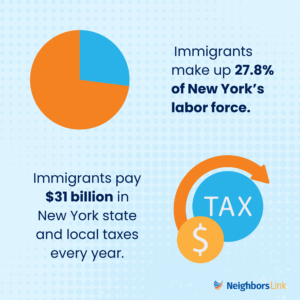 New York is currently facing significant outmigration and population loss. If we want to continue to have a thriving economy in New York State, we need workers.
New York is currently facing significant outmigration and population loss. If we want to continue to have a thriving economy in New York State, we need workers.
The immigrant workforce is already a critical component of New York’s economy. Immigrants make up 27.8% of New York’s labor force and pay $31 billion in New York state and local taxes every year.
There are nearly half a million vacant jobs in New York. Data from the NY Department of Labor indicates that some of the jobs most in demand are Construction Laborers, Customer Service Reps, Childcare, Maintenance, Healthcare, and Janitors, many of which are jobs in industries that rely heavily on an immigrant labor force.

